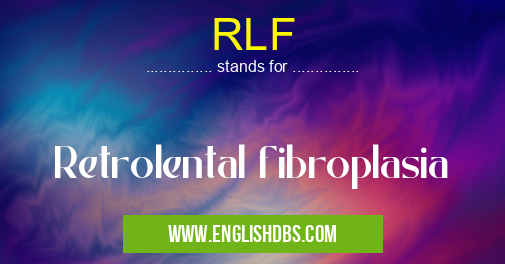What does RLF mean in PEDIATRIC
RLF occurs when premature babies are exposed to high levels of oxygen for extended periods. This can cause the formation of abnormal blood vessels in the retina. These vessels are fragile and can leak, leading to scarring and vision problems.

RLF meaning in Pediatric in Medical
RLF mostly used in an acronym Pediatric in Category Medical that means Retrolental fibroplasia
Shorthand: RLF,
Full Form: Retrolental fibroplasia
For more information of "Retrolental fibroplasia", see the section below.
What is RLF?
Symptoms of RLF
- White or cloudy pupils
- Vision impairment
- Strabismus (crossed eyes)
- Nystagmus (involuntary eye movements)
- Retinal detachment
Diagnosis and Treatment
RLF is diagnosed through a comprehensive eye exam. Treatment options include:
- Laser therapy: To seal off abnormal blood vessels
- Cryotherapy: To freeze and destroy abnormal tissue
- Anti-VEGF injections: To suppress blood vessel growth
Prevention
RLF can be prevented by:
- Careful monitoring of oxygen levels in premature infants
- Using supplementary oxygen only when necessary
- Gradually reducing oxygen levels as infants mature
Essential Questions and Answers on Retrolental fibroplasia in "MEDICAL»PEDIATRIC"
What is Retrolental Fibroplasia (RLF)?
Retrolental Fibroplasia (RLF) is a rare eye condition that affects premature infants, resulting in abnormal blood vessel growth in the retina. This can lead to scarring, retinal detachment, and even blindness.
What are the risk factors for RLF?
Premature birth, especially before 28 weeks gestation, is the primary risk factor for RLF. Other factors include:
- Low birth weight
- Oxygen therapy for respiratory distress syndrome
- Blood transfusions
- Certain medications, such as corticosteroids
How is RLF diagnosed?
RLF is diagnosed through a comprehensive eye examination by an ophthalmologist. The exam includes:
- Dilation of the pupils to examine the retina
- Ultrasound imaging to assess the extent of blood vessel growth
- Fluorescein angiography to visualize the retinal blood flow
What are the treatment options for RLF?
Treatment for RLF depends on the severity of the condition. Options may include:
- Laser therapy to seal off abnormal blood vessels
- Cryotherapy to freeze and destroy the affected tissue
- Surgery to repair detached retina
What are the long-term effects of RLF?
The long-term effects of RLF vary depending on the severity of the condition. They may include:
- Impaired vision or blindness
- Strabismus (misalignment of the eyes)
- Nystagmus (involuntary eye movements)
- Glaucoma
How can RLF be prevented?
Prevention of RLF involves:
- Careful monitoring of oxygen levels in premature infants
- Limiting the use of oxygen therapy
- Providing alternative therapies for respiratory distress syndrome
- Avoiding blood transfusions whenever possible
Final Words: RLF is a potentially blinding condition that can impact the lives of premature infants. Early detection and prompt treatment are crucial for preserving vision. By adhering to preventive measures and seeking timely medical attention, parents can help reduce the risk of RLF and ensure the optimal eye health of their children.
RLF also stands for: |
|
| All stands for RLF |
